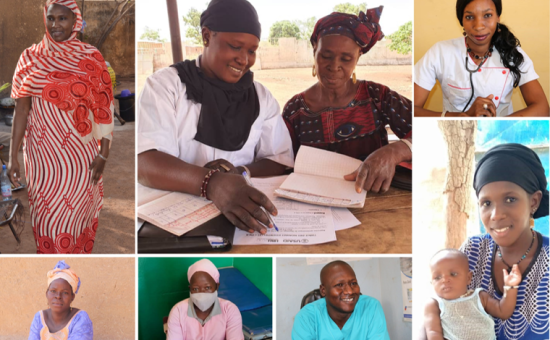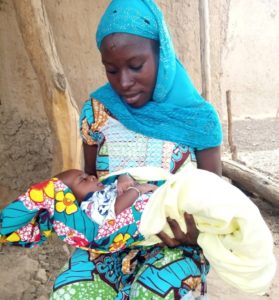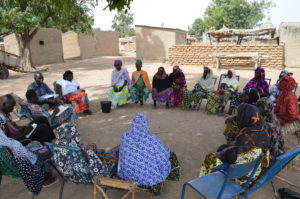
02 Jul Celebrating HRH2030 Mali: Key Achievements in Strengthening Human Resources for Health
The Human Resources for Health in 2030 (HRH2030) Mali program, funded by USAID Mali from January 2018 to December 2020, provided technical assistance directly to the Ministry of Health and Social Development (MHSD) to strengthen human resources management for the health workforce and improve the quality of care and services throughout the health system. HRH2030 Mali was implemented by Chemonics, the prime recipient of the global HRH2030 program, in partnership with subrecipient consortium partner University Research Company (URC). HRH2030 published the program’s final report in March 2021. This article summarizes the key achievements stated in the report.

Photo: A young mother and her healthy baby.
HRH2030 Mali was designed to address human resource needs that had been articulated in the country’s 2009-2015 national strategy for human resources for health but were still unrealized. These included the need for well-defined supervision and coaching processes, documents to support regional and district-level human resource managers, and the need for increased use of health workforce data for decision-making. In addition to providing direct assistance to the MHSD, HRH2030 Mali implemented activities in collaboration with other ministries, with a focus on ensuring that HR policies and practices facilitated the availability of quality health care and services in six regions: Kayes, Sikasso, Segou, Koulikoro, Mopti, and Bamako. In particular, the program aimed to strengthen health service provider training at all levels of the health system to improve the effectiveness and efficiency of maternal, newborn, and child health, family planning and nutrition services.
HRH2030 Mali’s key achievements include:
Access to quality health care services for 2,126,280 women and 1,509,130 babies have measurably improved. HRH2030 built health workforce capacities to implement the national strategy to improve health care and services, training 254 health worker coaches on maternal, newborn and child health, family planning, nutrition, and malaria at more than 1,100 community health centers and referral centers. In addition to the focus on coaching, HRH2030 supported efforts to familiarize health workers with the government’s national norms and standards for maternal and child heath care services.
The story of Dr. Namory Camara highlights one physician’s experience in being trained in compliance standards through the HRH2030 program and then, having mastered the material, becoming a program coach for 24 community health centers.
Use of services at the community level have measurably increased, and quality of care and services at community health facilities improved. Through HRH2030’s community approach, care and services at community health facilities in Kayes, Koulikouro, Sikasso, Segou, and Mopti improved, spurring increases in health facilities’ service utilization rates from 38 to 73 percent, impacting more than 2 million Malians in rural communities. In addition, the percentage of women choosing to deliver at health centers, not at home, increased from 35 percent to 89 percent.
Women’s groups were a key entry point for expanding communities’ involvement in taking charge of their own health. The story of Kamoune Diambre Rural Maternity Hospital Matron Fatoumata Bado is one example of how collaboration with women’s groups led to increased use of prenatal care and delivery services in on area.

Photo: Rural women’s groups, like this one in Mali’s Diola district, played a key role in increasing health facility usage in their communities.
The MHSD has stronger national and regional leadership and ownership of managing the health workforce. Over the course of the program, HRH2030 supported quality improvement of HRIS and capacity building for HRH managers at regional and district levels, who are now implementing continuous improvement plans. Dr. Etienne Coulibaly, director of the HRH Department in the MHSD, became a firm believer in the HRH2030 approach.
“At the beginning of our collaboration, I was not convinced of the benefit of using the quality improvement approach to solve our internal problems,” Dr. Coulibaly said. “With the results we have achieved… I am now one of the advocates for this approach.” Learn more about how HRH2030 supported the HRH department on page 28 of the report.
Quality and use of health services and workforce data quality were strengthened. HRH2030 refreshed skills of health workers on data monitoring tools, supported development of National Multisectoral Nutrition Plan 2021-2025, and introduced its community approach to Scaling Up Nutrition Partnership for future interventions.
The story of Yaya Kone, regional director of human resources in the Koulikoro region, illustrates how supportive HR coaching helped him to address challenges including a lack of information on the workforce, and incomplete and inaccurate personnel data in the human resources system. See page 29 of the report.
Mali’s surveillance system, rapid response capacity, quality case management and national coordination for COVID-19 was strengthened. With USAID Mali’s support for the government’s response to COVID-19 outbreak, HRH2030 provided trainings, rapid tests and dissemination of protocols to health facilities, and reached community groups to deliver prevention messages. This work is highlighted on pages 33-36 of the report.
Read the complete final report, available here.





